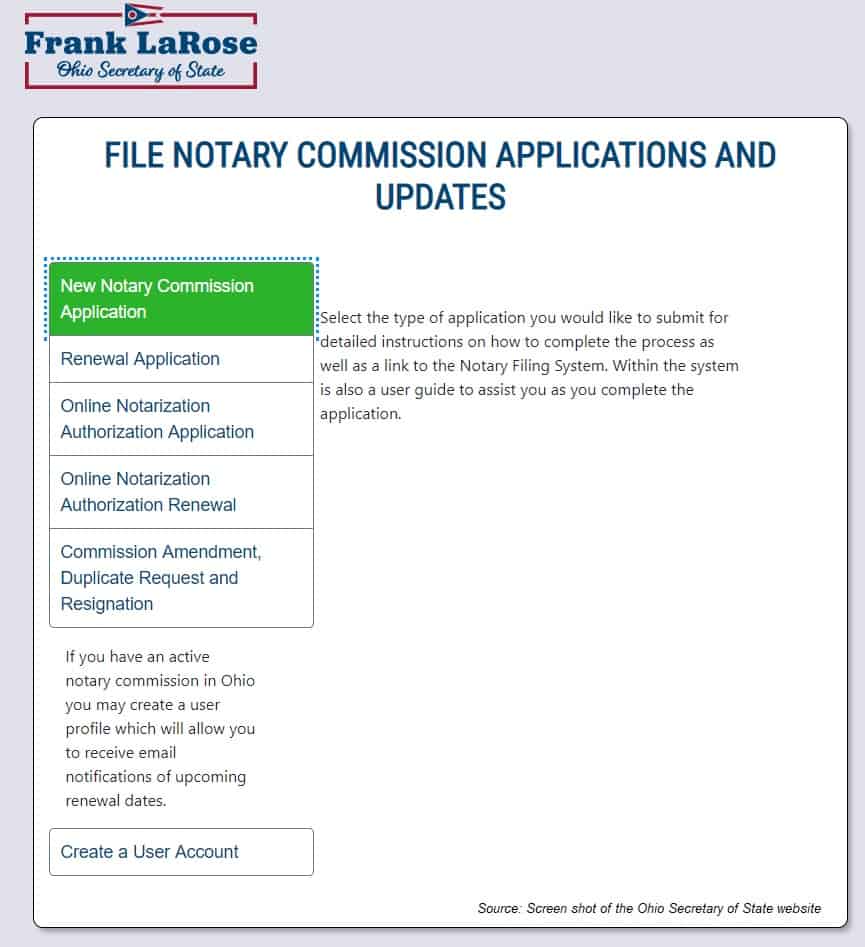(**) Disclosure: This post may contain affiliate links, meaning RealEstateCareerHQ.com will get a commission if you decide to make a purchase through the links, but at no additional cost to you.
To become a notary loan signing agent in Ohio, an applicant must go through a criminal record check, complete a 3-hour course, pass the notary exam, submit a notary public application to the Ohio Secretary of State. You also need to pay the filing fee, purchase a notary seal and journal.
So what does a loan signing agent do in Ohio? When a home buyer is getting a mortgage to purchase a property, or a homeowner needs to refinance their property, there will be loan documents involved.
Your role as a notary loan signing agent is to walk through the set of loan documents with the borrower and witness them in signing the paperwork.
You also need to verify the identity of the signers, place the notary stamp on the signed documents, then send them back to the escrow company.
But keep in mind that you should NOT be providing legal advice, and you cannot explain the terms of the loan documents to the borrower.
In this guide, you’ll find the steps to become a notary loan signing agent in Ohio. I’ll also talk about the course’s content, exam, income figures, and other helpful details about this career. The goal is to give you a better understanding of whether this profession is a good fit for you.
Note that this guide is for general information only and not to provide any professional advice. Although I’ve tried to put down info as accurate as I could possibly find, you should always refer back to the Ohio Notary Commission and the State law.
Would you like to learn how to make $75 to $200 per signing appointment? You must check out the Loan Signing System from Mark Wills. (**) This is one of the best training programs for loan signing agents. Many students have achieved remarkable business success after taking this program.
8 Steps to Become a Notary Loan Signing Agent in Ohio

Step 1: Meet the basic requirement
- At least 18 years of age
- Legal resident of Ohio
- Able to read and write English
Step 2: Perform a background check
You will go to an approved Webcheck provider in getting a BCI report. The key is to ensure there is no disqualifying offense as defined in section 4776.10 of the Revised Code or a violation of Chapter 2913 of the Revised Code)
Step 3: Complete the notary education

You need to complete a 3 hours notary course that is approved by the Ohio Secretary of State.
The objective of this education is to provide you with a full understanding of the responsibilities, duties, and professional standards of a notary public. Help to reduce complaints and lawsuits due to negligence or misconduct by a notary public.
There is a fee of $130 for education and testing. You will pay directly to the authorized provider.
Here’s a list of approved providers for the Ohio notary course and test
| Authorized Providers | Services |
|---|---|
| Adams County Clerk of Courts | In person |
| Butler County Bar Association | In person |
| Clermont County Notary Commission | In person |
| Columbus Bar Association | Online and in person |
| Lake County Bar Association | In person |
| Mahoning County Bar Association (Notary@mahoningbar.org) | Online only for renewal class. The rest will be in person. |
| National Notary Association | Online |
| Ohio Notary Institute (info@ohionotaries.org) | In person |
| Ohio Notary Services | Online and in person |
| Stark County Bar Association | Online and in person |
| Tuscarawas County Law Library | In person |
| Warren County Law Library | In person |
I prefer online education as this allows you to study whenever and wherever that is convenient for you. There is no headache in rushing to school.
Since the course material is already online, you could go back and review the concepts when you need it.
Once you complete the notary course, you’ll receive a Proof of Completion certificate. This document is necessary when you apply to the Ohio Secretary of State.
Step 4: Pass the Ohio notary test

There isn’t a standard exam from the Ohio Secretary of State. Rather, the test is administered by the approved education provider as part of the course package. This will be given to you after you complete the 3- hour notary course.
What is the format of the Ohio notary exam?
I called with one of the authorized education providers. Their staff said the OH notary exam would consist of 30 multiple-choice questions. You have 90 minutes to write it.
Different course providers may have different exam formats. But I don’t think they would vary too much from one another.
Besides focusing on the course materials, reading over the Ohio Revised Code, Chapter 147 can help you gain a thorough understanding of the Notaries Public and Commissions. I’ll leave its link in the reference section at the end of this post.
What if I fail the OH notary test?
You can rewrite it after a 30-day waiting period. Note that you only have two chances in writing it. If you fail them both, you will need to re-register for the class and pay an extra $130.
Also, after you obtain the BCI background check report, you must pass the test within 6 months.
Step 5: Submit the notary commission application to the Ohio Secretary of State
The Ohio Secretary of State is the office that grants the notary commission to applicants and maintains records of all notaries public in Ohio. There is no need to record the notary commission with the county, OH Secretary of State will directly handle all the registration matters.
This will be an online application. To start off, you must create a user account on their website. The questions on the application are pretty strict forward—for example, your name, business address, background info.

You are also required to upload the following documents:
- Image of your signature (.png, .jpg, .jpeg, .pdf)
- Criminal record check (.pdf)
- Proof of education (.pdf)
- Proof of completion of test (.pdf)
There is a $15 application fee and you could pay it with a credit card.
As I’m reading their website, the office recommends using the browser Chrome, Firefox, or Safari when accessing their system. If you need help to navigate their online portal, you could click here to download their user guide.
Step 6: Receive the notary public commission
The Ohio Secretary of State office will review your application. Once they approve it, you will receive the notary public commission through email.
It’s better to review and make sure all the details are correct. (e.g., your name, county of residence, commission dates). Also, sometimes emails could fall into the junk folder by mistake. If you didn’t receive their approval response, make sure you check there as well.
Step 7: Get the notary business supplies
Notarize documents with a standardized seal

To start the notary loan signing business, you’ll need have a seal. It ensures you won’t leave out any required details when notarizing a document.
You may purchase the notary seal from the office supplies store. If you do, then they usually would require the info on your notary commission certificate.
You need to make sure that the seal could fulfill the Secretary of State’s requirements.
Before entering upon the discharge of official duties, a notary public shall obtain the seal of a notary public.
The seal shall consist of the coat of arms of the state within a circle that is at least three-quarters of an inch, but not larger than one inch, in diameter and shall be surrounded by the words “notary public,” “notarial seal,” or words to that effect, the name of the notary public, and the words “State of Ohio.”
The seal may be of either a type that will stamp ink onto a document or one that will emboss it. The name of the notary public may, instead of appearing on the seal, be printed, typewritten, or stamped in legible, printed letters near the notary public’s signature on each document signed by the notary public.
Quote from Ohio Revised Code 147.04 Seal
Maintain a good record of business practice

You may find it at stationery, office supply stores, or through notary organizations.
As for the journal, I like how the Ohio Secretary of State allows you to maintain the records electronically. This makes it a lot easier to organize and retrieve files. Of course, using less paper is good for the environment too.
The journal is an essential part of good business practice. It acts as proof that you have taken reasonable steps to identify the signer of a document. You should record the list notarial acts in chronological order.
(B) For every online notarization, the online notary public shall record the following information in the electronic journal:
(1) The date and time of the notarial act;
(2) The type of notarial act;
(3) The title or a description of the record being notarized, if any;
(4) The electronic signature of each principal;
(5) The printed full name and address of each principal;
(6) If identification of the principal is based on personal knowledge, a statement to that effect;
(7) If identification of the principal is based on satisfactory evidence of identity pursuant to division (E)(2) of section 147.64 of the Revised Code, a description of the evidence relied upon, including the date of issuance or expiration of any identification credential presented;
(8) If identification of the principal is based on a credible witness or witnesses, the name of the witness or witnesses;
(9) If the notarization was not performed at the online notary public’s business address, the address where the notarization was performed;
(10) A description of the online notarization system used;
(11) The fee, if any, charged by the notary;
(12) The name of the jurisdiction in which the principal was located at the time of the online notarization;
(13) The recording upon which the identification of the principal is based, as required under division (D)(3) of this section;
(14) Any other information required by the secretary of state.
Quote from Ohio Revised Code 147.65 Electronic journals
Furthermore, since the journal could contain confidential details, you must keep it securely. The rule states that the electronic journal shall enable access by a password or other secure means of authentication.
As for the notary seal, you should store it in a locked and secured area, where only you have direct and exclusive control of it. (e.g. a locked drawer or cabinet.)
Step 8: Incorporate electronic and online notarization into your practice

One thing I really like about this industry in Ohio is the option for notary to work digitally. Doing so could bring you great convenience to streamline your notary practice.
But let me first explain the difference between “Electronic notarization” and “Online notarization.”
“Electronic notarization,” sometimes known as “e-notary,” is where you meet the signer in person, but the documents are signed and notarized digitally.
On the other hand, “Online notarization” is also being done digitally. But you are not physically present with the signer. Instead, you would verify their the signer’s identity through video and audio conference.
The Ohio Secretary of State allows both electronic and online notarization. But to become an online notary, you need to submit another application, take a 2-hour course, and pass a test from an authorized education provider.
At the time I’m writing this post, I could only find a company, Ohio Notary Services LLC, that administers the education program and test.
Furthermore, you need to state the name of the online notarization system when you are filling out the application.
How much do notary loan signing agents make in Ohio?

The average annual income of Loan Signing Agents in Ohio is $47,962. The income typically ranges between $27,999 to $56,931. Top earning loan signing agents in Ohio are making over $84,930.
Top 10 Highest Paying Cities for Loan Signing Agents in Ohio
| City | Annual Salary |
|---|---|
| Cleveland | $48,280 |
| Columbus | $46,010 |
| Toledo | $45,923 |
| Dayton | $45,495 |
| Cincinnati | $44,348 |
| Canton | $42,648 |
| Lorain | $42,167 |
| Middletown | $42,069 |
| Youngstown | $41,161 |
| Akron | $40,931 |
source: ZipRecruiter – March 13, 2022
How much you could make as a notary loan signing agent would depend on the amount of time and effort you put into the business. Also, whether you obtain the signing appointments from a signing services agency or directly from escrow companies could play a crucial role in your income.
Can you make over $10,000/month as a loan signing agent? Be sure to check out our notary earning guide. You’ll find a case study where a loan signing agent has built her business to such a successful figure.
Is there demand for notary loan signing agent in Ohio?
As long as people are obtaining mortgages or refinancing their homes, there would be a demand for notary loan signing agents in Ohio.
All originated mortgages in Ohio
| YEAR | All originated mortgages in Ohio |
|---|---|
| 2017 | 241,167 |
| 2016 | 262,449 |
| 2015 | 235,058 |
| 2014 | 203,927 |
| 2013 | 306,698 |
| 2012 | 336,141 |
| 2011 | 245,688 |
| 2010 | 283,698 |
| 2009 | 309,496 |
| 2008 | 231,697 |
| 2007 | 313,279 |
Source: Consumer Financial Protection Bureau – Home Mortgage Disclosure Act (HMDA) (March 18, 2020)
Furthermore, some states are “Attorney states,” which means only an attorney can handle the closing paperwork. Whereas, others are “Escrow States” where a loan signing agent can do the work.
According to the First American Title, Ohio is a not an “Attorney State,” which is good news if you are interested in starting a notary loan signing business.
What education do you need to become a Ohio notary public?

To become a notary public in Ohio, you’ll need to complete a 3-hour notary course from an approved education provider.
But a good place to learn about this profession is by reading the Ohio Revised Code, Chapter 147 – Notaries public and commissioners. It pretty much covers all the topics that you need to know about being a notary loan signing agent in Ohio.
Here is the list of topics you can learn from it:
147.01 Appointment and commission of notaries public – notary public for state.
147.011 Definitions.
147.02 [Repealed].
147.021 Education and testing.
147.022 Criminal records check.
147.03 Term of office – oath – removal for violating oath.
147.031 Renewal of commission.
147.032 Investigations; penalties.
147.04 Seal.
147.041 Persons commissioned prior to September 20, 2019.
147.05 Recordkeeping; change of address; notice of resignation or conviction of disqualifying offense.
147.051 Database of notaries.
147.06 Certified copy of commission as evidence – fee.
147.07 Powers – jurisdiction.
147.08 Fees.
147.09 [Repealed].
147.10 Notary public acting after commission expires.
147.11 Forfeiture.
147.12 Acts done by notary public after term valid.
147.13 Removal for receiving excess fees.
147.14 Removal from office for certifying affidavit without administering oath.
147.141 Prohibited acts.
147.142 Advertisement as immigration consultant; other prohibited acts.
147.31 [Repealed].
147.32 Representatives of veterans’ organizations may be appointed as commissioners of the state.
147.33 to 147.36 [Repealed].
147.37 Fees for commissions.
147.371 Duplicate commission.
147.38 [Repealed].
147.39 Prior notarial acts by armed forces officers valid.
147.40 Manner of taking depositions.
147.51 Notarial acts.
147.52 Notarial acts by authorized person.
147.53 Taking an acknowledgment.
147.54 Recognized certificate of acknowledgment.
147.541 Acknowledged before me defined.
147.542 Notarial certificates.
147.543 [Repealed].
147.55 Statutory short forms of acknowledgment.
147.551 Jurat form.
147.56 Notarial act performed prior to January 1, 1974.
147.57 Uniformity of the law.
147.58 Uniform recognition of acknowledgments act.
147.59 Designated alternative signer.
147.60 Definitions.
147.61 Applicability.
147.62 Standards for online notarizations and online notaries public.
147.63 Application to be authorized as online notary public.
147.591 Electronic documents.
147.631 Online notary course fees.
147.64 Authority of online notary public.
147.65 Electronic journals.
147.66 Steps to ensure security.
147.99 Penalty.
Quote from Ohio Revised Code – Chapter 147
Is there a exam to become a notary in Ohio?
To become a notary in Ohio, you need to pass a test administered by an authorized education provider. One of the providers said that their exam consists of 30 multiple-choice questions, and you’ll have 90 minutes to write it.
How much does it cost to become a notary loan signing agent in Ohio?

It costs approximately $175 to become a notary loan signing agent in Ohio. Here’s the breakdown:
- OH notary application filing fee – $15
- Notary course and exam fee – $130
- Notary stamp- $30
There could be other expenses involved, such as laptop, E&O insurance, travel expenses, and other business supplies.
How long does it take to become a notary signing agent in Ohio?

You could complete the notary course and test in a day. Since all the registration is done electronically, this would eliminate the mailing delivery time.
It should take less than two weeks to become a notary signing agent in Ohio.
Can a felon be a notary loan signing agent in Ohio?
Having a conviction for a felony may impact the application to become a notary loan signing agent in Ohio. The Ohio Secretary of State needs to make sure that you are a person with credibility, truthfulness, and integrity to fulfill the responsibilities of the position.
The office specifically states that they would reject an application where the applicant had convicted of a disqualifying offense as defined in 4776.10 of the Revised Code or a violation of Chapter 2913 of the Revised Code.
Chapter 2913
Theft and Fraud Offenses – includes theft, unauthorized use of property, possession or sale of unauthorized cable television device, telecommunications fraud, unlawful use of telecommunications device, motion picture piracy, passing bad checks, misuse of credit cards, counterfeiting, forgery, criminal simulation, making or using slugs, trademark counterfeiting, Medicaid fraud, Medicaid eligibility fraud, defrauding a rental agency or hostelry, tampering with records, illegally transmitting multiple commercial electronic mail, securing writings by deception, personating an officer, unlawful display of law enforcement emblem, defrauding creditors, illegal use of food stamps or WIC program benefits, insurance fraud, workers ‘compensation fraud, identity fraud, or receiving stolen property.
4776.10
Quote from Ohio Secretary of States – Criminal records check and disqualifying offenses
Any offense that is a felony and that has a direct nexus to an individual’s proposed or current field of licensure, certification or employment.
Having a felony does not necessarily mean your application will automatically be declined. It depends on the severity and nature of the conviction. The Secretary of State would review it on a case-by-case basis.
If you have any concerns about the approval of your application, you can contact the Secretary of State’s office before sending it.
How to renew a notary commission in Ohio?
You must renew the notary commission every five years. You will need to complete a 1-hour notary class, and the course fee is $45. Once again, you are required to obtain a BCI background check.
You can submit the renewal application within 90 days before your current commission expires. The registration can be done through the same online portal as your initial application, and the application fee is $15.
To avoid an interrupted business period, it’s better to renew before your current notary commission is expired. Typically speaking, it would take 4 to 6 weeks to process the renewal.
Can I notarize for a family member in Ohio?
You must not notarize any documents where you have any financial or beneficial interest in the transaction. Therefore, notarizing a document for any family member could call into question, and such practice should be avoided.
I have more questions about being a notary loan signing agent in Ohio, where could I obtain more details?
You may contact the Ohio Secretary of State, Notary Commission:
- Walk-in Client Service Center, 22 North Fourth Street, Enter from Fourth Street ONLY, Columbus, Ohio 43215
- Phone: 614.644.4559
They also have an online contact form.
If you want to succeed in the loan signing industry, you must check out this loan system training program. If you review the testimonials of his students, you’ll be amazed at how the notary career changes their life after they learned from Mark Wills. (**)
Disclaimer: The information in this post is for general information only, and not intend to provide any advice. They are subjected to change without any notice, and not guaranteed to be error-free. Some of the posts on this site may contain views and opinions from individual not related to JCHQ Publishing. They do not necessarily reflect our view or position.
(**) Affiliate Disclosure: Please note that some of the links above are affiliate links, and at no additional cost to you. Our company, JCHQ Publishing will earn a commission if you decide to make a purchase after clicking on the link. Please understand that we include them based on our experience or the research on these companies or products, and we recommend them because they are helpful and useful, not because of the small commissions we make if you decide to buy something through the links. Please do not spend any money on these products unless you feel you need them or that they will help you achieve your goals.
Reference:
- First American Title- Your Guide to Real Estate Customs by State (source)
- Ohio Secretary of State – Notary Public (source)
- Ohio Secretary of State – Education and testing information and authorized providers (source)
- Ohio Secretary of State – Criminal records check and disqualifying offenses (source)
- Ohio Revised Code Chapter 147 (source)
- Salary.com – Notary Signing Agent Salary in Ohio (source)
- ZipRecruiter – Loan Signing Agent Salary in Ohio (source)
- Consumer Financial Protection Bureau – Home Mortgage Disclosure Act (HMDA) (source)

